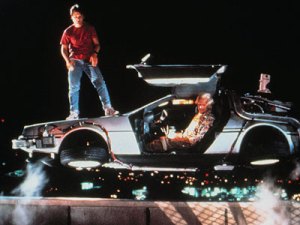 So there I was, walking to the record store to buy a new 45 when this guy from the future parked his Delorean on the street right next to me. I tried to get a picture, but my camera was completely out of film. I ran to the phone to call my mom, but I was out of quarters, too! I sighed. All I knew, as soon as I got home I was writing my best friend at camp. She’d never believe this. I just wished it wouldn’t take four whole days for the letter to reach her!
So there I was, walking to the record store to buy a new 45 when this guy from the future parked his Delorean on the street right next to me. I tried to get a picture, but my camera was completely out of film. I ran to the phone to call my mom, but I was out of quarters, too! I sighed. All I knew, as soon as I got home I was writing my best friend at camp. She’d never believe this. I just wished it wouldn’t take four whole days for the letter to reach her!
Okay, if that paragraph made the least bit of sense to you, then you’re probably over the age of 30. Or, really into history. (Ancient history, if you happen to be a middle-grader.) Because let’s face it, when it comes to technology — be it music, computers, cell phones — change happens faster than some guy speeding through time in his souped-up Delorean.
Now don’t get me wrong, I have nothing against change. (If not for change, I’d still be sporting a really bad perm and blue eyeshadow and aspiring to be an MTV veejay.) But rapid changes in technology do present an interesting dilemma to the writer — something I got to thinking about while reading a popular MG series recently with my 10-year-old son. In one book, a key plot point centered around the protagonist’s brother working in a film developing lab. No biggie, right? Except about halfway through the book, I came to realize my son had absolutely no freaking clue what a film developing lab was. Our subsequent conversation went something like this:
Son: Hey, what’s film?
Me (incredulous): The stuff you put in cameras.
Son: You put stuff in cameras?
Me: Yeah, to record the pictures.
Son: Oh. So it’s like an SD card? (Pause) I don’t get it. Why do you need a lab then? Don’t those things plug right into the computer?
(Mom’s old head hits the desk.)
Amazing. In the span of less than ten years, one book managed to become completely dated… And actually on the verge of not making any sense. Not because the writer used some obsolete pop reference (I mean, we all know better than to go tossing in a little Right Said Fred, lest we want to peg our book squarely in dark ages of the early nineties). Rather, because the author included a bit of technology that seemed entirely relevant at the time. I cringe thinking how much my main characters actually IM each other in my first book (my proverbial drawer novel, where it will likely live forever). I suppose I could go back and change all those IMs to texts. But no doubt they’ll go the way of the telegram someday, too. Replaced by what, I don’t know. A chip in the head that transmits messages straight to your brain?
And the funny thing is, technology doesn’t just date a novel. It can help drive plot, too. Just imagine if Harry, Hermione and Ron had Google. Or e-mail. No more hours searching for answers in the forbidden stacks of the library. No more post owls. (Okay, so I don’t really want to imagine that so much.) But what if Judy Blume’s Wendy had a computer and a YouTube account? Cyber-bully, anyone? And I’m guessing if Claudia and Jamie tried to run away to the Metropolitan Museum of the Arts today, they’d be found almost instantly thanks to the GPS apps their parents installed on their cell phones.
So what’s a writer to do? (Besides hiding in the corner, clutching their coffee and please-don’t-ever-let-it-become-obsolete iPhone.) It seems to me one of three things:
- Create a whole new fantasy world, a la Harry Potter, where there is no technology to contend with… witches and wizards don’t need email. Or the internet. Or regular cameras. They have owls! They have spells! They have paintings that move and talk!
- Head back to the future — or the past. Here, you can either make up your own technology, as in Feed. Or, just go ahead and set the whole story in some very definable point the past, as in When You Reach Me (which, of course, also featured its own futuristic time-travel technology, albeit without the Delorean).
- Just roll with the times, knowing that inevitably they are a-changing. I mean, so what if in ten years kids don’t text anymore, right? We’ll all be ROTFL anyway. Thanks to the chips in our heads, that is.
So how about you? How do you deal with technology when you write? Avoid? Embrace? Create your own? Please, tell me in the comments below! Or, send a post owl. That would be pretty cool, too.
Jan Gangsei went from typing her first short story on a Brother typewriter to drafting her first novel with her thumbs on her iPhone. She couldn’t imagine ever having to use whiteout again. Also, she’s had that Maroon 5 song Payphone stuck in her head since she started writing this post. If anyone could suggest a new song, she’d appreciate it. Anything but Right Said Fred, that is.
